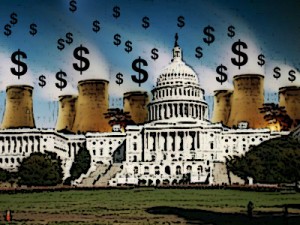Dickinson to Durban » Carbon Markets, Climate Change, Key COP17 Issues, Summer Reading Responses » The Key To International Negotiations?
The Key To International Negotiations?
by Claire Tighe ’13
In order to maintain a livable atmosphere for life on Earth, big polluters such as the United States, need to significantly reduce their greenhouse gas (ghg) emissions. Without either a carbon cap-and-trade system or a carbon tax imposed by the federal government, the future of climate change looks bleak, particularly in relation to the pending international climate change agreements (For a great introduction of the dynamics and concerns of the cap-and-trade system, see Holme Hummel’s slideshow).
As economist Nat Keohane presents in his video about cap-and-trade here, a concrete, comprehensive domestic emissions restriction will encourage other international states to create their own policies, or even sign onto a post-Kyoto agreement. If competing countries, such as China, see that the United States has made a commitment to cut carbon, they will as well. The benefit of preventing disastrous climate change is one that far outweighs the small cost of initial cuts to carbon emissions. As one of the largest polluters in the world, the United States should be able to make the first step. China will follow.
Furthermore, as our own Professor Heiman argues in his lecture “An Inconvenient Truth of Neoliberal Carbon Trading,” adopting a carbon cap will facilitate international agreements on climate change. The creation of individualized domestic policies by each stakeholder would allelivate the pressure for a global, unified agreement (Heiman). In addition, the European Union, another very important player in the negotiations, has already adapted a cap-and-trade system. The United States’ acceptance of a similar program will give way to further agreement and partnership on the global issue of climate change.
In 2009, the president of the Natural Resource Defense Council, Frances Beinecke, argued, “The crisis of global warming is so urgent that we can’t wait for lawmakers, industry, and the American people to spend years hashing out the details of an entirely new system. We have to act now to reduce emissions, and a declining cap is the way to do it.” Is it time we scrap the idea of an Evironmental Protection Agency (EPA) imposed tax, and reintroduce cap-and-trade? At this point, politicians must choose between the lesser of two. No carbon cap or no carbon tax are not options. Whatever it does, the United States needs to decide upon a limit of its emissions. And fast.
Sources:
Clean Energy Works. The Facts of Cap-and-Trade. http://vimeo.com/8847746?hd=1
Hieman, Michael. An Inconvenient Truth of Neoliberal Carbon Trading.
Hummel, Holmes. An Introduction to Cap-and-Trade Climate Policy. http://www.slideshare.net/grist/cap-trade-thru-musical-chairs-short
Putting the Price on Carbon: An Emissions Cap or a Tax? http://e360.yale.edu/content/feature.msp?id=2148
Story of Stuff. Cap and Trade. http://www.storyofstuff.com/capandtrade/
Filed under: Carbon Markets, Climate Change, Key COP17 Issues, Summer Reading Responses · Tags: cap-and-trade, carbon market, carbon tax, Claire Tighe, climate change, climate negotiations, environmental protection agency, frances beincke, Global climate change, Governing Climate Change, international cooperation, market-based solution, michael heiman, mitigation, natural resource defense council, UNFCCC









I agree that the United States needs to take action. I am struggling to decide if cap and trade or a tax makes more sense for our country as it stands today. Should we limit the amount of overall emissions or should we have a set price on carbon emissions? I’m not really sure, but you are right, something has to give and the United States needs to act.